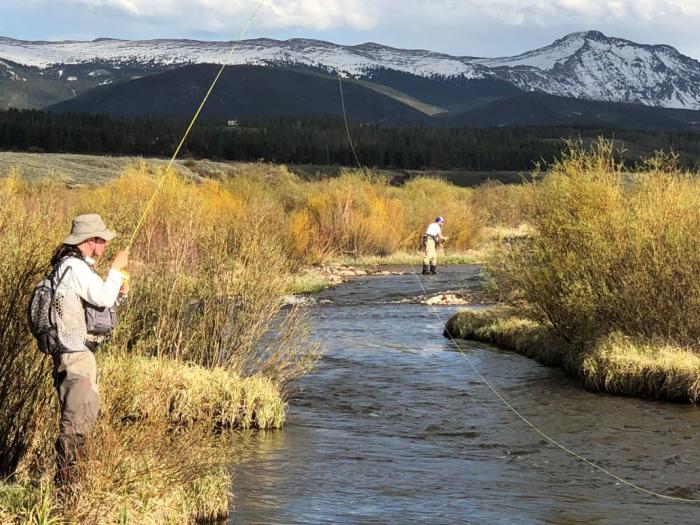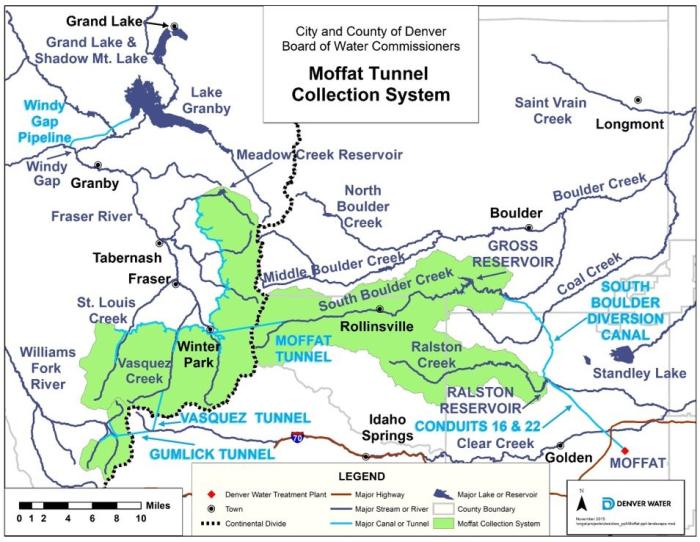Denver Water (November 30, 2023)—The Fraser River ties eastern Grand County’s high-country environment together the way U.S. Highway 40 connects communities from Winter Park to Granby.
The river, flowing through the most populated section of the county’s postcard scenery, has been the focus of yearslong efforts to improve its water quality, aquatic habitat and recreational offerings.
In late summer 2023, it got yet another lift, benefiting from a new, collective effort led by the Colorado Water Trust and including Denver Water, local irrigators, state officials, the Colorado River District, the Coca-Cola Co. and Learning By Doing, the cooperative group of water representatives on both sides of the Continental Divide.
The parties fashioned a 10-year arrangement that — when water is available — will put additional water into Grand County’s Fraser River during the late summer, when its flows are typically low due to the end of runoff season, diversions to the Front Range and agricultural needs.
Put simply, the Colorado Water Trust secured about 50 acre-feet of water from Grand County Irrigated Land Company, which goes by GCILC and owns water rights in the area, to be used for the river and the fish that live in it. (That’s roughly enough water to serve 100 to 150 families a year.)
Under the agreement, Denver Water will leave 50 acre-feet of water in the upper reaches of the Fraser near Winter Park, instead of diverting it into the Moffat Collection system. GCLIC makes Denver Water whole by assigning 50 acre-feet of its water shares that are stored in Meadow Creek Reservoir, which is downriver of Denver Water’s Fraser River diversion point, over to the utility, which also has storage rights in the reservoir.
This map shows how the Fraser River flows northwest from Winter Park to Granby. The agreement involving Denver Water and the Colorado Water Trust means more water will flow along that stretch of the river late in the season, aiding conditions for fish. Instead of diverting water into the Moffat Tunnel (shown in blue on the map), Denver Water will leave water in the Fraser basin for environmental purposes. Image credit: Denver Water.
“Historically the Upper Fraser River near Winter Park has seen low flows, particularly in August and September when resident trout are starting their fall spawning migration. Boosting flows at this time can help those fish have successful spawning runs and keep this valuable recreational fishery healthy,” said Tony LaGreca, the Colorado Water Trust’s project manager for the initiative.
The latest agreement required significant coordination with water users and state officials and comes on top of other work over the last decade to improve the popular river.
Denver Water has a significant impact on the Fraser’s flows as it diverts water from the upper reaches of the river into its Moffat Collection system for use on the Front Range.
Consequently, the utility in the last decade has emphasized work to improve the condition of the river. Such efforts are part of the Colorado River Cooperative Agreement, a landmark pact signed in 2013 that pledged greater cooperation between Front Range and West Slope water interests.
That work includes the creation of a sediment trap near Winter Park to capture road sand running off U.S. 40 that would otherwise mar water quality in the river. That project, a collaboration of Denver Water and several partners, has been working since 2013 to ensure cleaner water in the Fraser by keeping hundreds of tons of sand out of the waterway.
Denver Water also worked with Learning by Doing and other partners beginning in 2015 to restore a stretch of river called Fraser Flats north of Winter Park. The work included changes to the streambed to create deeper channels and planting of hundreds of willows and cottonwoods along the banks.
That project has been successful in creating better aquatic habitat by shading the river and giving fish more places to cool off when water levels drop, leading to a boost in fish numbers.
Denver Water has also completed several other environmental improvement projects in Grand County as part of its mitigation agreements related to the ongoing expansion of Gross Reservoir in Boulder County.
Once complete, Gross Reservoir’s expanded capacity will provide more flexibility to Denver Water in how it manages its water supply and kick off an agreement that would see Denver Water leave up to 1,000 additional acre-feet of water in the Fraser River to address periods of high temperatures and low stream flows.
This latest effort, with the Colorado Water Trust, took a lot of time to put together, said Nathan Elder, manager of supply for Denver Water.
Elder credited his colleague, Cynthia Brady, a senior engineer at Denver Water, for leading the work and coordinating with so many organizations, including state water officials who needed assurance the project wouldn’t affect other water interests.
“We had to find a way to meet everybody’s needs. It didn’t come together quickly; a lot of different stakeholders needed to come together and work closely with the Colorado Division of Water Resources,” Brady said.
“Ultimately this proved to be a good agreement, and a good project where everyone saw benefits. I’m glad we at Denver Water could be involved and play a big role in making this happen.”
Denver Water
Author: Todd Hartman
Read the original Denver Water article.

